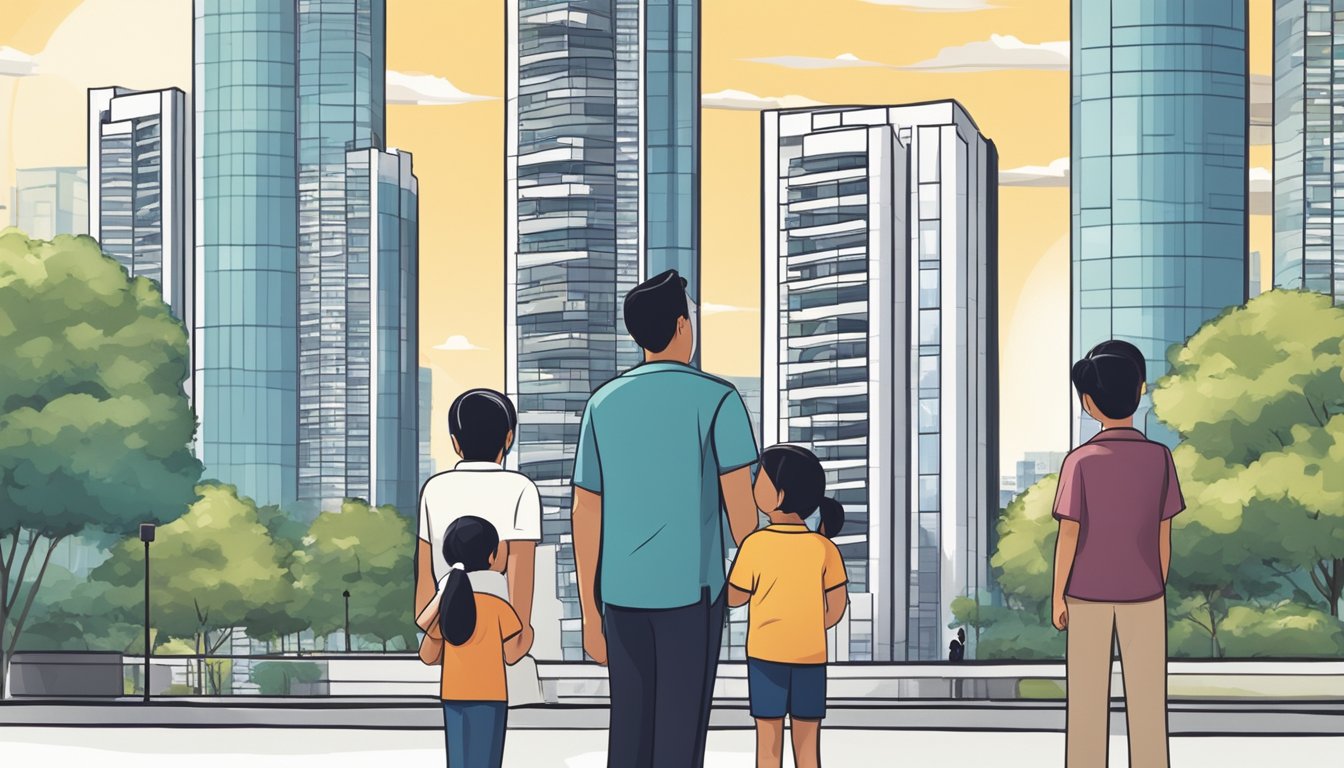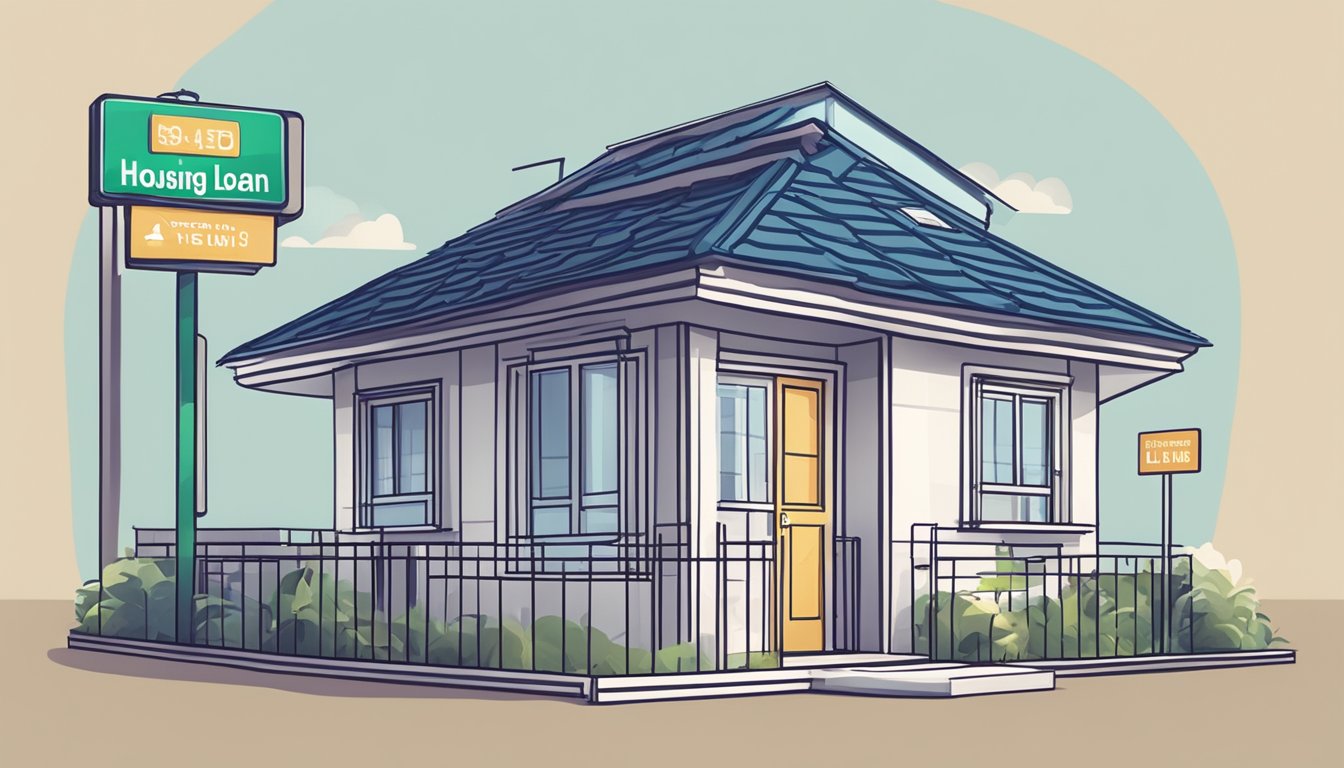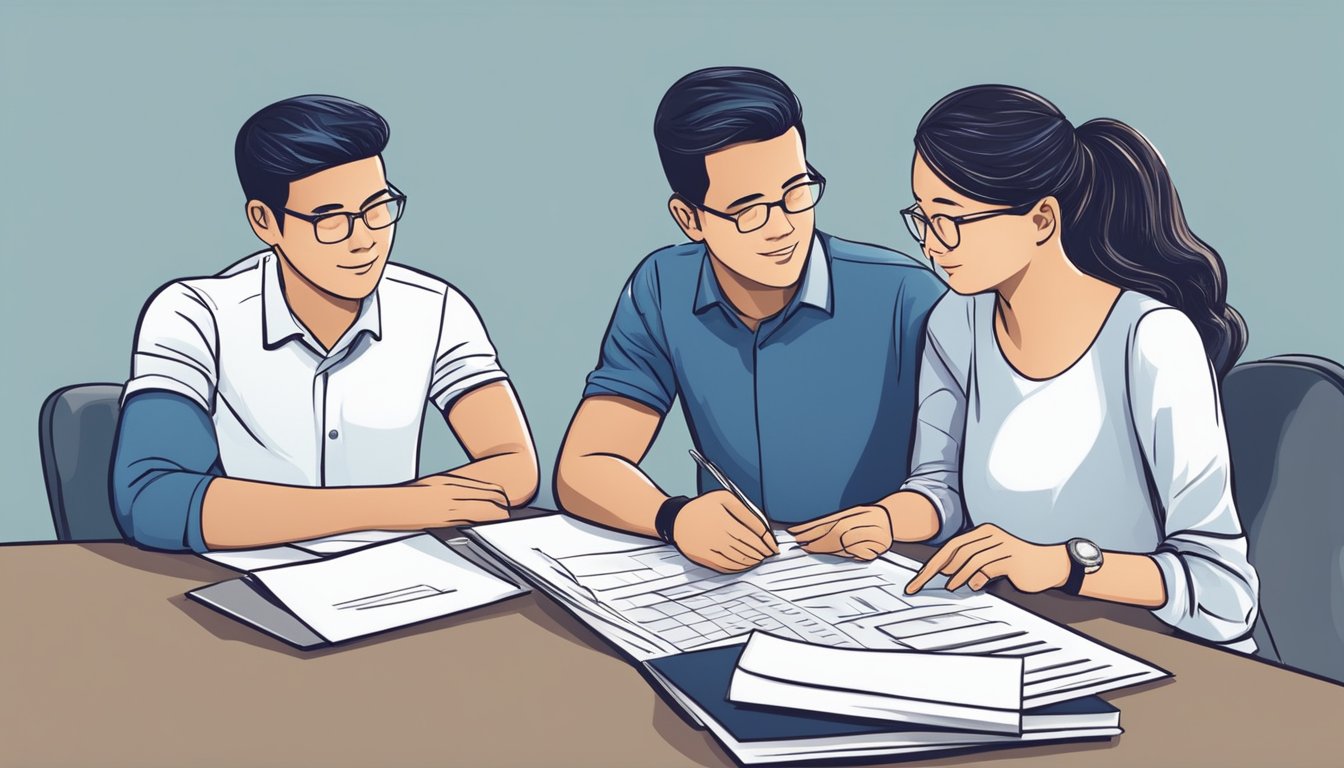If you’re planning to buy a house in Singapore, you’ll need to navigate the complex world of housing loans. Understanding housing loan limits is an essential part of this process. In Singapore, the government regulates the amount of money you can borrow for your home purchase, based on various factors such as the type of property, the loan tenure, and your age.

The loan-to-value (LTV) ratio is one of the most critical factors that determine how much you can borrow. In Singapore, the LTV ratio for HDB loans is 80%, which means you’ll need to pay a minimum of 20% of the property’s value as a down payment. For private properties, the LTV ratio varies depending on the loan tenure and your age. Moreover, the government has implemented various measures to tighten the LTV ratio for property purchases to curb speculation and prevent a property bubble.
To be eligible for a housing loan in Singapore, you must meet various criteria, such as citizenship, age, income, and credit score. You’ll also need to consider other upfront costs such as stamp duty, legal fees, and valuation fees. With so many factors to consider, it’s essential to do your research and understand the various financing options available to you. In this article, we’ll guide you through the process of understanding housing loan limits in Singapore and help you navigate the property market with confidence.
Key Takeaways
- The loan-to-value (LTV) ratio is a crucial factor that determines how much you can borrow for your home purchase in Singapore.
- To be eligible for a housing loan, you must meet various criteria such as citizenship, age, income, and credit score.
- Understanding financing options and upfront costs is essential to navigate the property market with confidence.
Understanding Housing Loan Limits in Singapore

If you are planning to buy a property in Singapore, you must be familiar with the loan limits imposed by the Monetary Authority of Singapore (MAS). These limits are put in place to ensure that borrowers do not overextend themselves financially and to maintain long-term stability in the property market. In this section, we will explain the basics of loan-to-value (LTV) limits, total debt servicing ratio (TDSR), and mortgage servicing ratio (MSR) to help you understand how these limits affect your ability to secure a housing loan in Singapore.
Loan-to-Value (LTV) Basics
LTV ratio refers to the percentage of the property’s value that you can borrow from a financial institution (FI). In Singapore, the LTV limit for bank loans is 75%, while the LTV limit for HDB loans is 90%. This means that you will need to make a downpayment of at least 10% for an HDB loan and 25% for a bank loan.
However, the LTV limit also depends on the tenure of the loan and the borrower’s age. For example, if the loan tenure is more than 30 years or extends beyond the borrower’s 65th birthday, the LTV limit for private properties is 55%, and for HDB flats, it is 25%.
Total Debt Servicing Ratio (TDSR) and Its Impact
TDSR is a measure of your ability to service your debt obligations, including your housing loan. It calculates the percentage of your income that goes towards paying off your debts, including credit card bills, car loans, and other personal loans. In Singapore, the TDSR limit is 60%, which means that your total debt obligations should not exceed 60% of your income.
The TDSR limit has a significant impact on your ability to secure a housing loan. If your TDSR exceeds 60%, you may have to reduce your loan amount or find a co-borrower to increase your income and lower your TDSR.
Mortgage Servicing Ratio (MSR) Explained
MSR is a measure of your ability to service your housing loan. It calculates the percentage of your income that goes towards paying off your housing loan. In Singapore, the MSR limit is 30%, which means that your monthly housing loan repayment should not exceed 30% of your income.
The MSR limit is particularly relevant for HDB loans, where the MSR limit is 35% for new flats and 30% for resale flats. If your MSR exceeds the limit, you may have to reduce your loan amount or find a co-borrower to increase your income and lower your MSR.
In conclusion, understanding the loan limits in Singapore is crucial when applying for a housing loan. You should also be aware that different financial institutions may have different underwriting standards, and you should do your research to find the best loan package that suits your financial needs.
Eligibility Criteria for Housing Loans

If you’re looking to buy a home in Singapore, one of the most important factors to consider is your eligibility for a housing loan. Here are some of the key eligibility criteria you need to keep in mind:
Age and Income Considerations
To be eligible for a housing loan in Singapore, you must be at least 21 years old. The maximum age limit for borrowing varies depending on the type of loan and the lender, but it is typically 65 years old or the age at which you retire, whichever comes first.
Your gross monthly income is another important consideration when it comes to eligibility for a housing loan. Lenders typically require that your monthly income be at least three times the amount of your monthly loan repayment.
First-Time Buyers vs. Existing Homeowners
If you are a first-time buyer, you may be eligible for certain grants and subsidies that can help you with your down payment and other costs associated with buying a home. However, if you are an existing homeowner looking to upgrade or buy a second property, you may face more stringent eligibility criteria.
Special Provisions for Different Demographics
Singapore’s government has implemented various housing policies to help different demographics, such as singles, couples, families, and seniors, with their housing needs. For example, there are different eligibility conditions for buying a flat and the CPF Housing Grants available for different demographics.
It’s important to note that eligibility criteria for housing loans can vary depending on the lender and the type of loan you are applying for. Before you start the process of borrowing, it’s important to do your research and make sure you meet the eligibility criteria of the lender you are considering.
Financing Options and Loan Tenure

When it comes to financing your housing purchase in Singapore, you have two main options: HDB loans and bank loans. HDB loans are offered by the Housing and Development Board, while bank loans are offered by commercial banks. The main difference between the two is that HDB loans have more stringent eligibility criteria and lower interest rates, while bank loans have more flexible eligibility criteria and higher interest rates.
HDB Loans vs. Bank Loans
If you are looking for a more affordable option, an HDB loan may be the right choice for you. HDB loans have a maximum loan tenure of 25 years, and the interest rate is fixed at 2.6% per annum. However, you must meet certain eligibility criteria to qualify for an HDB loan, such as income and citizenship requirements.
On the other hand, if you prefer more flexibility and are willing to pay a higher interest rate, a bank loan may be a better option for you. Bank loans have a maximum loan tenure of 35 years, and the interest rate can be either fixed or floating, depending on your preference and the bank’s policies. However, you must meet the bank’s eligibility criteria and undergo a credit assessment before you can be approved for a bank loan.
Determining Your Loan Tenure
The loan tenure is the period over which you will be repaying your housing loan. The maximum loan tenure in Singapore depends on the type of property you are purchasing. For HDB flats, the maximum loan tenure is 25 years, while for private properties, it can be up to 35 years.
When determining your loan tenure, it is important to consider your financial situation and your ability to repay the loan. A longer loan tenure will result in lower monthly repayments, but you will end up paying more in interest over the long term. On the other hand, a shorter loan tenure will result in higher monthly repayments, but you will pay less in interest over the long term.
Fixed vs. Floating Home Loan Rates
When choosing between a fixed or floating home loan rate, it is important to consider your risk tolerance and financial goals. A fixed home loan rate means that your interest rate will remain the same throughout the loan tenure, while a floating home loan rate means that your interest rate will fluctuate based on market conditions.
If you prefer certainty and stability, a fixed home loan rate may be the right choice for you. However, if you are willing to take on more risk and potentially save money in the long term, a floating home loan rate may be a better option for you.
In conclusion, choosing the right financing option and loan tenure for your housing purchase in Singapore is an important decision that requires careful consideration. By understanding the differences between HDB loans and bank loans, determining your loan tenure, and choosing between fixed and floating home loan rates, you can make an informed decision that suits your financial needs and goals.
Downpayment and Other Upfront Costs

If you’re planning to purchase a property in Singapore, it’s important to be aware of the various upfront costs you’ll need to pay. In this section, we’ll discuss the minimum cash downpayment requirements, CPF usage and CPF housing grants, and other additional costs you should consider.
Minimum Cash Downpayment Requirements
To purchase a property in Singapore, you’ll need to pay a downpayment of at least 5% of the purchase price in cash. If you’re purchasing an HDB flat, you’ll need to pay a minimum cash downpayment of 10% of the purchase price. For private properties, the minimum cash downpayment is 25% of the purchase price.
CPF Usage and CPF Housing Grants
If you’re a Singaporean or Permanent Resident, you can use your CPF savings to pay for the downpayment and other upfront costs of your property purchase. The amount you can use depends on your CPF savings and the type of property you’re purchasing.
Additionally, you may be eligible for a CPF housing grant to help with the purchase of your resale flat. The amount of the grant depends on your income and the type of flat you’re purchasing.
Additional Costs to Consider
Aside from the downpayment and CPF usage, there are other additional costs you should consider when purchasing a property in Singapore. These include stamp duty, legal fees, and property insurance.
Stamp duty is a tax you’ll need to pay when you purchase a property. The amount of stamp duty you’ll need to pay depends on the purchase price and the type of property you’re purchasing.
Legal fees are also an important consideration. You’ll need to engage a lawyer to handle the legal aspects of your property purchase, such as conveyancing and title search.
Finally, property insurance is important to protect your investment. You’ll need to purchase fire insurance for your property, and you may also want to consider other types of insurance, such as home contents insurance.
Overall, it’s important to be aware of the various upfront costs you’ll need to pay when purchasing a property in Singapore. By planning ahead and understanding these costs, you can make an informed decision about your property purchase.
Navigating the Property Market

If you’re considering buying a property in Singapore, there’s a lot to consider. The property market in Singapore is a complex and dynamic environment that is subject to a range of factors that can affect the value and availability of properties. In this section, we’ll explore some of the key factors that you need to consider when navigating the property market in Singapore.
Cooling Measures and Their Effects
One of the most significant factors that can affect the property market in Singapore is the government’s cooling measures. These measures are designed to regulate the property market and prevent prices from rising too quickly. They can include restrictions on the number of properties that an individual can own, limits on loan-to-value ratios, and stamp duties on property transactions.
If you’re considering buying a property in Singapore, it’s important to understand the impact that these cooling measures can have on the market. They can affect the availability of properties, the price of properties, and the financing options that are available to you.
Understanding Ownership and Resale Conditions
Another important factor to consider when navigating the property market in Singapore is the ownership and resale conditions of the property. For example, if you’re buying an HDB flat, you’ll need to meet certain eligibility criteria and comply with certain resale conditions if you want to sell the property in the future.
It’s important to understand these conditions before you buy a property, as they can affect your ability to sell the property in the future and the price that you can sell it for.
Investing in Private Property vs. HDB Flats
Finally, when navigating the property market in Singapore, you’ll need to consider whether you want to invest in private property or an HDB flat. Private property can offer greater flexibility and potential for capital appreciation, but it can also be more expensive and subject to greater market volatility.
On the other hand, HDB flats can offer more affordable prices and greater stability, but they can also be subject to restrictions on ownership and resale conditions.
Ultimately, the decision of whether to invest in private property or an HDB flat will depend on your individual circumstances and investment goals. However, it’s important to consider the pros and cons of each option before making a decision.
In summary, navigating the property market in Singapore can be a complex and challenging process. By understanding the cooling measures, ownership and resale conditions, and the pros and cons of investing in private property vs. HDB flats, you can make a more informed decision and increase your chances of success in the property market.
Frequently Asked Questions

What’s the maximum amount you can borrow for a home loan in Singapore?
The maximum amount you can borrow for a home loan in Singapore depends on several factors, such as your age, income, and existing loans. The Monetary Authority of Singapore (MAS) has set Loan-to-Value (LTV) limits for property loans. For HDB flats, the LTV limit is 80%, while for non-HDB properties, the limit is 75%.
How do you calculate your housing loan limit in Singapore?
To calculate your housing loan limit in Singapore, you need to consider your income, age, and existing loans. You can use an online housing loan calculator to estimate your loan eligibility and monthly instalments. It’s essential to note that the housing loan limit varies depending on the property type and loan tenure.
Is there an age cap for securing a housing loan in Singapore?
Yes, there is an age cap for securing a housing loan in Singapore. The maximum loan tenure is 30 years for HDB flats and 35 years for non-HDB properties. The loan tenure cannot extend beyond the age of 75.
What’s the longest loan tenure available for private properties in Singapore?
The longest loan tenure available for private properties in Singapore is 35 years. The loan tenure cannot extend beyond the age of 75.
Could you tell me about the Mortgage Servicing Ratio rules set by MAS?
The Mortgage Servicing Ratio (MSR) is the percentage of your income that goes towards servicing your mortgage loan. The MAS has set the MSR at 30% of your gross monthly income. This means that your monthly mortgage instalment cannot exceed 30% of your gross monthly income.
How is the loan-to-value ratio determined for property loans in Singapore?
The loan-to-value ratio (LTV) is the percentage of the property’s value that you can borrow from a financial institution. The LTV limit for property loans in Singapore depends on the property type, loan tenure, and whether you have any existing loans. The LTV limit ranges from 55% to 80%.
Remember that the maximum loan amount you can borrow for a housing loan depends on your eligibility and the property type. It’s crucial to do your research and consult with a financial advisor to ensure you make informed decisions.




